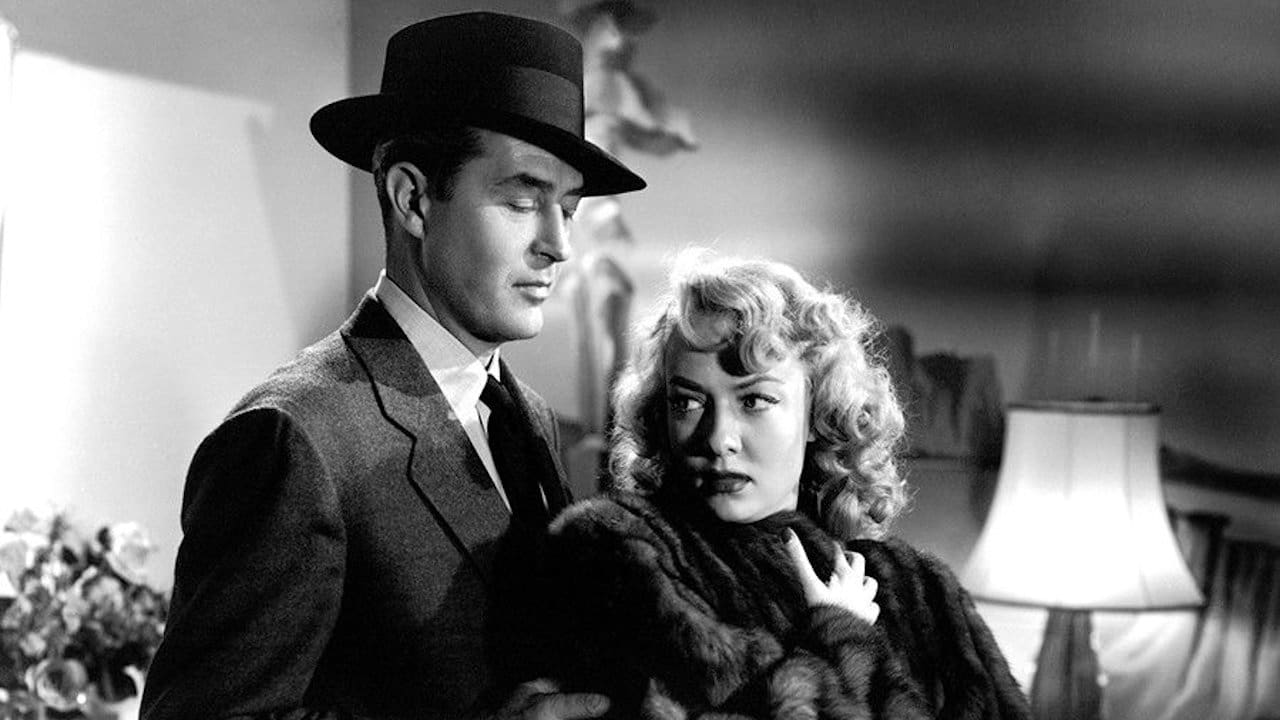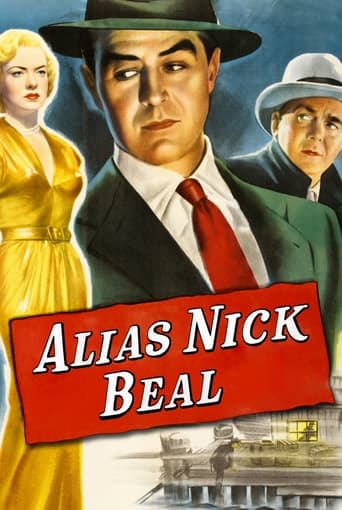SincereFinest
disgusting, overrated, pointless
Doomtomylo
a film so unique, intoxicating and bizarre that it not only demands another viewing, but is also forgivable as a satirical comedy where the jokes eventually take the back seat.
Gurlyndrobb
While it doesn't offer any answers, it both thrills and makes you think.
Skyler
Great movie. Not sure what people expected but I found it highly entertaining.
bkoganbing
The Faust legend gets yet another retelling in modern post war America with Thomas Mitchell as an honest District Attorney looking for evidence to convict a racketeer. A conviction in this case will propel him to higher office.Into the story walks a gentleman named Nicholas Beal played with intensity by Ray Milland. The account books supposedly destroyed Milland says he can produce and produce them he does. Of course Mitchell is grateful and Milland becomes part of his inner circle.With Mitchell now being talked about for the governorship, Milland incurs the mistrust of all around him including Mitchell's wife Geraldine Wall and the Reverend George MacReady. MacReady who himself has played many a sinister character on the big and small screen knows sinister when he sees it. In fact he's the first to recognize Milland for what he is.When a man's influence doesn't work Milland plants Audrey Totter in Mitchell's circle. This is a whole lot like the way Ray Walston used Gwen Verdon to get at Tab Hunter in Damn Yankees. Only this is far more serious.Ray Milland who before The Lost Weekend played all kinds of light parts was now getting heavier dramatic fare in his career and handling it most successfully. He's probably at his most menacing on the screen in Alias Nick Beal.As for Mitchell for once he didn't die on the screen. Years ago I had a teacher who said that Thomas Mitchell had to have the record for screen deaths in major motion pictures. Although I can think of a few in addition to this one like Stagecoach and It's A Wonderful Life where he lived until the final end credits, I think the man that taught me might have had something. Mitchell is fine as a man desperately trying to do the right thing and having to contend with his own ambitions at the same time.Paramount normally did not go in for noir films, but in this case they produced one with classic satanic overtones. In the end Milland makes a rather interesting confession as the film ends. It explains his attitude and his character. I'd make it a point to check it out.
lilszoo2011
The Devil vs. the Anderson family... *** This review may contain spoilers *** This review is for a Father Knows Best episode that seems to be a point of contention concerning the film, "Alias Nick Beal" and needs clearing up, as follows... Real name: "Mr. Beal Meets his Match." This is a favorite episode that just aired yesterday (01/15//13) on AntennaTV. It is another of the morality tales that Father Knows Best is so famously known for, with the Andersons actually taking on the Devil and becoming triumphant by the end of the 30 minutes they had to deal with him! There seems to be some controversy on who played the Devil. It is listed here on IMDb as John Williams and NOT listed in Ray Millands' credits. It was listed on the TV credits after the show as being John Williams. It also was listed as being John Williams on the OFFICIAL Father Knows Best website in two places, as being him in the episode listing and in the pdf file that houses the 'actual' script synopsis written at the time with the players listed and all in the old typewriter type, the episode is #111 and is in the fourth season. It is mistakenly listed as being Ray Milland on the Wikipedia website, Mr. Milland did play a Devil's character named NICK Beal in a 1949 movie, "Alias Nick Beal" unconnected to FKB. But our character here is named HARRY Beal, so it is not Mr. Milland reprising his old movie roll as has been suggested on these threads. I'm sure anyone who loves FKB as I and many others do love to get their trivia facts straight as it might come in handy if we ever got on Jeopardy! Also the DVD's of FKB is out on Netflix for renting, they have seasons one thru four, the 4th season (the one we are discussing here) is out and is in my saved NetFlix queue. So any doubts can be erased when personally viewing this episode and seeing John Williams as the Devil. John Williams by the way, played Audrey Hepburns chauffeur father, Thomas Fairchild in 1954's "Sabrina" for anyone wanting to compare him against Harry Beal in FKB. (Interesting note that Mr. Williams and Mr. Milland played together in a fantastic film "Dial M for Murder".) Also you can rent FKB to watch online at Amazon. I haven't looked yet but there may even be some episodes on Hulu or YouTube that could satisfy anyone interested in getting facts earlier than the DVD release. Hope this helps! UPDATE: This episode will be airing again May 30, 2013 on AntennaTV at 1:00 pm Eastern Standard Time. UPDATE: This episode aired today as had been previously noted and I watched it again, it IS John Williams who plays the Devil and it ends with him on a branch outside Jim and Margrets bedroom window and crashing to the ground when he realizes he has 'lost' because Margret will not let Jim go. I hope this correction has been helpful to those faithful to fact. LOL
noir guy
This great supernatural noir hybrid deserves to be far better known and released on DVD (Wake up, Paramount!). Shadowy fixer Nick Beal (Ray Milland) is more than he appears to be (Check out his name for starters). When decent D.A. and seemingly "incorruptible enemy of the legions of evil" Joseph Foster (Thomas Mitchell) claims he'd sell his soul to put away an influential racketeer, saturnine Nick Beal gets on his case and subsequently smooths the way to a successful prosecution and, possibly, a path to the governor's office. But what does it profit a man if he gains the world but loses his soul? This modern dress morality play gives us an answer as well as proving to be a gripping tale of character and drama. Smoothly directed by John Farrow - whose previous film was also a noir with supernatural overtones, NIGHT HAS A THOUSAND EYES (DVD release too please, 20th Century Fox), and who had directed Milland in the earlier more plot-oriented noir THE BIG CLOCK - and atmospherically filmed by Lionel Lindon (who later shot THE MANCHURIAN CANDIDATE), this is a gripping and unusual noir. Bolstering this offbeat generic tale are a clutch of great performances, particularly those of the saturnine Milland, tormented Thomas Mitchell and a touching Audrey Totter as the fallen angel waterfront lush enlisted by Beal to carry out the fleshier requirements of his plot. Given the era it was made, the Devil may not ultimately have all the best tunes here (which wasn't quite the case with Al Pacino's older Nick in the not altogether dissimilar THE DEVIL'S ADVOCATE) but this is still an unusual and tangy take on personal, spiritual and political corruption that is highly recommended and deserves to be more widely seen. As I said, DVD release please, Paramount!
theowinthrop
Ray Milland managed to do something that few critics were ever willing to admire him for. He was a good looking man of Welsh (not English) ancestry, who could play members of the English upper class. But he was always willing to stretch a bit more than other similar actors. For one thing, he could play villains. Even in his early career he was frequently cast as a weakling or a gigolo (as in "We're Not Dressing"). He was willing to experiment with comic roles as well as straight drama. The result was that from 1942 to 1951 or so Milland was a Hollywood star. He played the leads in films as various as "Reap the Wild Wind", "The Major and the Minor", "The Ministry of Fear", "The Big Clock", "The Lost Weekend", "Golden Earings", and "Alias Nick Beal". While some of his films were comedies (such as "The Major and the Minor" and "Skylark") quite a number were dramas or even melodramas. And some of his characters skirt the edge of acceptable behavior. He is a man who has just been released for committing a mercy killing of his wife in "The Ministry of Fear". Although he is basically innocent, he is a flirtatious type in "The Big Clock". Even in Wilder's "The Major and The Minor" there is a moment when Milland, smiling at the thought of what a real "knockout" "Sue-sue Applegate" (actually grown-up Ginger Rogers) is, suddenly gets a really pained look in his face - he does not like that he's thinking lascivious thoughts about a child.His deserved "Oscar" for "The Lost Weekend" is another example of this dark side - he is supposed to be a writer, but he is a poseur with a serious drinking problem. In fact, he contemplates suicide at the conclusion of the film, only to be stopped by Jane Wyman.In "Alias Nick Beal" he played his most sinister part (except possibly Tony Wendice in "Dial "M" For Murder"). Here he played Satan, and he is in total control of the game throughout of the movie - the game being politics and power over people. On one level, if one forgets the supernatural elements, "Alias Nick Beal" is as good an abject lesson in the back room deals of American politics as the comedies "The Senator Was Indiscreet" or Preston Sturges' "The Great McGinty". Only here, with violent death thrown in, the seediness of it all becomes more apparent. Possibly the best moment is when the honest, and mostly honorable, Thomas Mitchell is forced to shake hands with Fred Clark, the most notorious political boss in the state. On the other level is the serious attempt to keep some religious allegory in, with people like George Macready (here in a rare good guy part) noting that Beal resembles an ancient picture of the Devil, and that "Los islas de las almas perditas" where Beal comes from means, "The Island of Lost Souls". Religion does play a crucial role in the film, including it's completion.Leslie Halliwell made the observation that after this film none of the stars ever did as well again. This is not true. Milland did play the evil Tony Wendice, and Macready went on to the mad French general in "Paths of Glory". But more important, Milland kept showing his ability to stretch in the remaining decades of his life. Besides writing his interesting autobiography "Wide Eyed in Babylon", he directed several films, he appeared in several televisions series (one of the few stars who did not fear the new medium - and he was rewarded here too, for in the 1970s and 1980s he was still appearing while many contemporaries retired). Finally he capped his career as the snobbish father in "Love Story". Actually his career is an example of just what can be accomplished if a person is not ashamed to jettison useless or outdated personalities for new ones.

